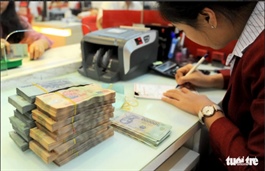Green finance must be unlocked to develop
Green finance must be unlocked to develop
The banking sector has been urged to unlock viable green finance to attract a broader investor base to facilitate its green transition.

The banking sector, as the key capital mobilisation channel for the economy, is responsible for “greening” investment capital flows for Vietnam to achieve its sustainable development goals.
According to Nguyen Chi Hieu, director of ESG Advisory at KPMG in Vietnam, the banking industry plays an increasingly important role in supporting the shift to a more sustainable future.
“As a financial intermediary, the banking industry is responsible for connecting top-down and bottom-up approaches to improve the efficiency of green financing,” Hieu said. “Credit institutions need to develop strategies for green credit activities in association with specific green goals.”
“The first step is to design and build a flexible green credit framework for a number of key industries and projects for further replication. The next step is to accelerate research and development for diverse sustainable and green products priority industries. Thus, banks can attract a wide range of customers while improving their competitiveness. For corporate customers, banks should design different green credit products to fulfill the needs of each type of business.”
Hieu added that credit institutions should proactively access different green financial sources, such as green investment funds and foreign financial institutions, by issuing green bonds for domestic and foreign markets.
“Moreover, the banking system needs to enhance training and capacity building for bank employees on green banking and green credit activities with a focus on green credit understanding, social and environmental risk assessment, and environmental credit appraisal to improve the capacity of the entire bank in implementing green credit,” Hieu said.
Mai Thanh Dung, vice director of the Institute of Strategy and Policy on Natural Resources and Environment under the Ministry of Natural Resources and Environment, said, “It is vital to develop a national green classification list in line with international standards, as it will accelerate sustainable development and environmental protection in Vietnam. The adoption of international standards for evaluating and classifying green projects will bring many significant benefits to the country in terms of economic, environmental, and social aspects. It also encourages the development of environmentally friendly projects in Vietnam.”
Dung revealed that the current proposed draft green classification list ensures compatibility and harmony with the green classification lists of Europe, ASEAN and many other countries. In particular, the list of proposed project types covers entire economic sub-sectors to facilitate investors in different fields in order for them to access green finance.
The banking sector, along with the nation, has taken a proactive and innovative approach in following the goals set forth by the government in the nation’s green growth strategy for 2021-2030 and vision to 2050, said Pham Thanh Ha, Vice Governor of the State Bank of Vietnam (SBV).
“In 2017-2022, the average growth rate of the banks’ outstanding debt for green credit had remained above 23 per cent per year. As of July, the total green credit balance in the nation was over $21.7 billion, accounting for 4.2 per cent of the total loans outstanding in the whole economy,” Ha said.
Out of 12 green areas receiving loans from the credit institutions in accordance with the SBV’s guidance, the main focus is on renewable energy and clean energy (45 per cent) and green agriculture (31 per cent). There will be 43 credit institutions granting green credit in 2023. However, green credit growth is far from the target of 10 per cent of total outstanding debt by the end of 2025.
The World Bank Group’s Country Climate and Development Report for Vietnam estimates that the country needs an additional $368 billion during 2022-2040, approximately 6.8 per cent of GDP each year, to achieve net-zero emissions. Among them, the private sector will contribute about $184 billion, while the contributions from the government and other external sources are about $130 billion and $64 billion, respectively.
Vietnam has also set a target of increasing its green economy’s contribution to GDP from $6.7 billion in 2020 to $300 billion by 2050.
























